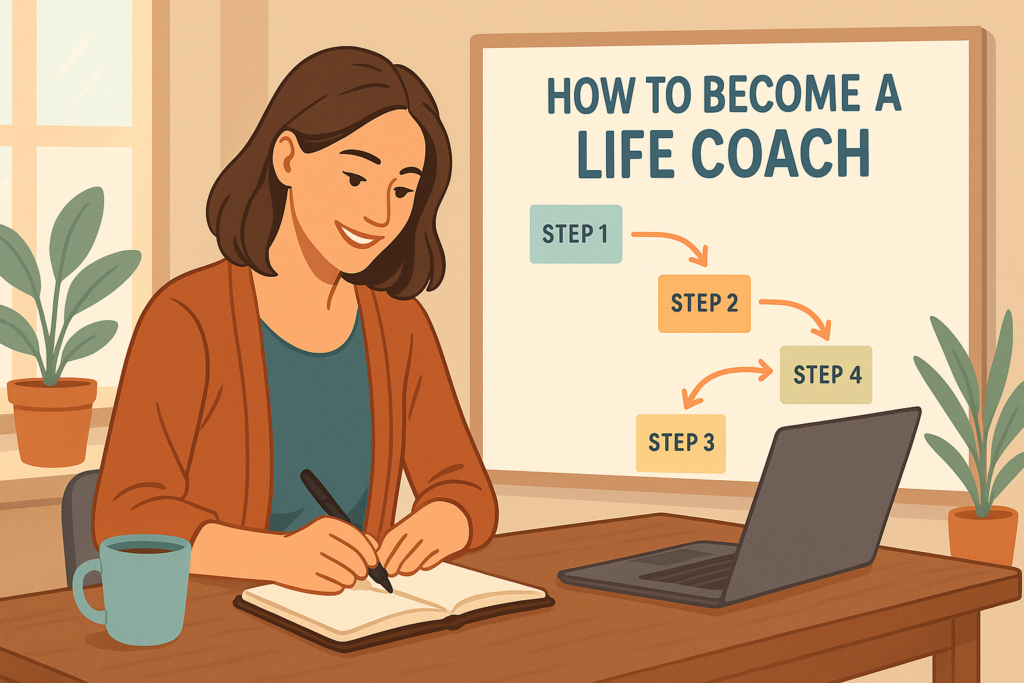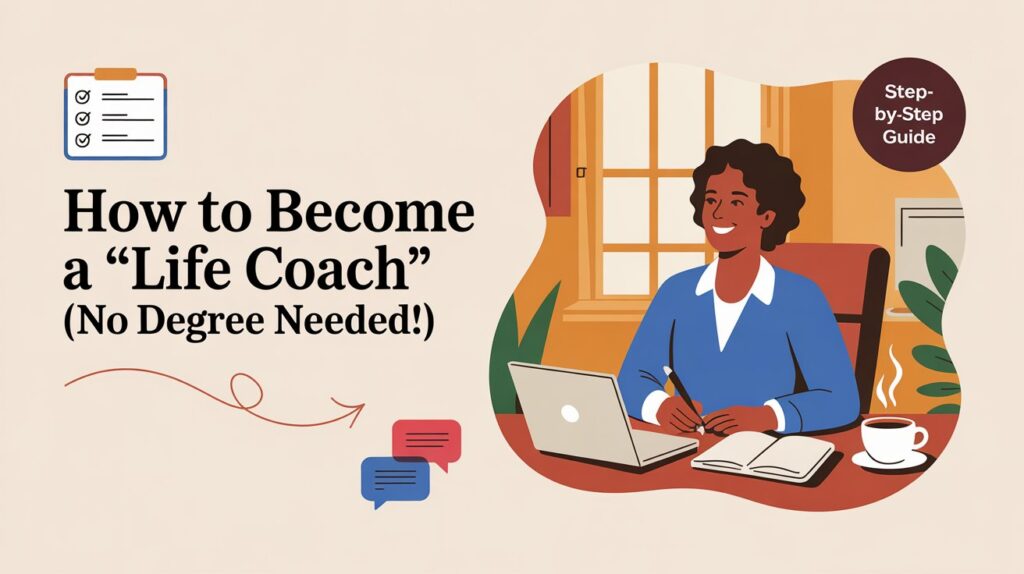Have you ever been the go-to person your friends call when they’re stressed out or stuck? Maybe you’re the one people trust with their “I don’t know what to do with my life” moments.
If you nodded even a little bit, you’re already showing signs that life coaching could be your thing.
In a world where everyone’s busy chasing goals, dealing with burnout, and trying to “figure it all out,” life coaches have become more important than ever.
And the beautiful part?
You don’t need to be some celebrity guru or have a fancy degree to become one. You just need the right heart, a strong foundation, and a willingness to grow — just like the people you’ll help one day.
So, if you’re ready to turn your natural gift for helping others into a meaningful career, let’s walk through it together — step by step.
First Things First: What Even Is a Life Coach?
Picture this:
You’re like the co-pilot sitting beside someone in their life journey.
You’re not there to fly the plane for them.
You’re there to help them read the map, navigate storms, and celebrate their milestones.
A life coach doesn’t diagnose problems like a therapist does. Instead, you help people set goals, unlock their potential, move past roadblocks, and live lives they’re actually excited about.
In short: You help them see possibilities they forgot they had.
Should You Really Become a Life Coach? (A Quick Gut Check)
Here’s a simple test:
- Do you genuinely enjoy listening to people?
- Do you get excited seeing others achieve their dreams?
- Are you naturally good at helping people think things through?
- Do you want to build a career around making a real difference?
If you’re getting little butterflies reading this, that’s your intuition saying, “This might be it.”
Of course, coaching isn’t just about cheering people on.
It’s about holding space, asking deep questions, and sometimes giving a little tough love (with a ton of kindness).
But if you’re willing to grow while helping others grow, you’re already halfway there.
What a Life Coach’s Day Actually Looks Like
Honestly, no two days are the same — and that’s part of the magic.
You might spend mornings talking with clients over Zoom, afternoons creating content for your website or social media, and evenings learning new coaching techniques.
Some days, you’ll feel like a superhero after a client tells you you’ve changed their life.
Other days, you’ll be deep in planning mode, figuring out how to build your next workshop or program.
It’s flexible, dynamic, and totally something you can shape around the life you want.
How to Become a Life Coach: Your Step-by-Step Map

Alright, let’s roll up our sleeves and map this out properly.
Step 1: Know Your “Why”
Before you dive into certifications or websites, take a moment and ask yourself:
Why do I want to be a coach?
- Is it because you overcame something and now you want to help others?
- Is it because you love seeing that “aha!” moment in people’s eyes?
- Is it because you want to create a career that actually feels meaningful?
Write your “why” somewhere you’ll see it often.
(Trust me — when things get overwhelming, your “why” will pull you through.)
Also, start thinking about the type of coaching that excites you most — career, relationships, wellness, confidence, leadership?
Choosing a niche later will make your life way easier.
Step 2: Get Some Solid Training (But Don’t Freak Out, It’s Totally Manageable)
Good news:
You don’t need a psychology degree or years of experience to be a great life coach.
You do need real skills though.
There are amazing programs out there that teach you:
- How to really listen (like, really listen)
- How to ask life-changing questions
- How to hold a coaching session that feels like magic
Look for programs accredited by the International Coach Federation (ICF) — they’re kind of like the gold standard.
A few popular programs in the U.S.:
- iPEC
- The Life Coach School
- Coach Training Alliance
Most programs take a few months to a year — and you can totally fit it around your current life.
Step 3: Sharpen the Skills That Make Coaches Great
Sure, certifications matter.
But what makes clients love you? It’s the soft skills.
Skills like:
- Deep listening (not just nodding while waiting to talk)
- Asking open-ended, curious questions (“What’s important about that to you?” instead of “Why didn’t you do it?”)
- Building genuine trust and safety
- Staying fully present (bye, distractions!)
The good thing? You can start practicing these every day — with your friends, family, even yourself.
Step 4: Get Certified (It’s a Big Trust Builder)
Technically, you don’t have to be certified to coach in the U.S.
But here’s the real talk:
Certification builds massive trust.
Especially when you’re starting out and people are looking for reasons to choose you over someone else.
ICF certification is the one most people recognize.
Start with Associate Certified Coach (ACC) level — it’s a great foundation.
Yes, it takes some work. Yes, it’s an investment.
But it can seriously open doors to better-paying clients, speaking gigs, and corporate work.
Step 5: Practice, Practice, Practice
Real growth comes from real experience.
At first, coach anyone who’s willing:
- Friends
- Friends of friends
- Volunteer groups
- Local business owners
Offer free or low-cost sessions in exchange for honest feedback and testimonials.
(Don’t worry — you’ll charge what you’re worth soon enough.)
These early sessions will teach you more than any textbook ever could.
Step 6: Build Your Coaching Business (Without Losing Your Mind)
Starting your business doesn’t have to be overwhelming if you break it down:
Here’s a simple starter checklist:
- Choose a name you love.
- Create a simple website (Squarespace, Wix, or WordPress are perfect).
- Set up a professional email and calendar (Google Workspace is great).
- Get a payment system ready (Stripe or PayPal).
Pro Tip: You don’t need everything perfect before you start coaching.
Start simple and level up as you grow.
Step 7: Market Yourself Authentically
Here’s the truth:
If nobody knows you exist, nobody can hire you — no matter how awesome you are.
But marketing doesn’t have to feel salesy or fake.
Think of it like this: Marketing = Telling people you can help them + Showing them how you do it.
Simple, honest ways to get noticed:
- Share tips and stories on Instagram, LinkedIn, or TikTok
- Start a blog or YouTube channel
- Host free workshops or webinars
- Ask happy clients for referrals
When you show up consistently and share from the heart, your dream clients will find you.
Do You Really Need a Certification?
Short answer:
No, but it helps a lot.
You can technically coach without one.
But getting certified shows you’re serious, trained, and trustworthy.
It also opens you up to working with companies or organizations that require certification.
Think of it like having a passport to bigger opportunities.
How Much Does It Cost to Become a Life Coach? (Real Talk)
Setting yourself up isn’t free — but it’s way cheaper than law school or med school.
Here’s a rough ballpark:
| What You Need | Cost |
|---|---|
| Training Program | $1,000 – $7,000 |
| Certification Fees | $300 – $700 |
| Website + Branding | $200 – $1,000 |
| Business Setup (LLC etc.) | $100 – $500 |
| Learning Tools & Software | $100 – $500/year |
Start lean. Grow smart. You’ll earn back your investment faster than you think if you’re consistent.
What Kind of Life Coaching Careers Are Out There?
Life coaching isn’t just one path.
You can become:
- A private coach (1:1 clients)
- A group coach (small coaching groups)
- A corporate coach (working with companies)
- A course creator (online programs)
- A speaker/author (spreading your message globally)
You can work from a beach, a cabin, your cozy home office — wherever life feels good for you.
Common Challenges (And How to Handle Them Like a Pro)
- Feeling like a fraud (Imposter Syndrome): Totally normal. Keep coaching anyway. Confidence grows with action.
- Struggling to get first clients: Offer free sessions, ask for referrals, join communities.
- Getting overwhelmed: Focus on one small step a day.
- Comparing yourself to other coaches: Stay in your lane. Your people are waiting for YOU, not a carbon copy of someone else.
Tips for Rocking Your Coaching Career Long-Term
- Keep learning. Stay curious.
- Get your own coach or mentor.
- Track client wins — celebrate them!
- Stay ethical and genuine always.
- Most importantly: Love the journey, not just the destination.
Inspiring Coaches Who Started Just Like You
- Tony Robbins wasn’t always a global name. He started with small workshops.
- Marie Forleo built her coaching empire through authenticity and smart content.
- Mel Robbins used her life experiences to connect deeply with her audience.
They didn’t have magic wands. They had commitment, heart, and consistent action.
And you can too.
Final Thoughts: You’re Closer Than You Think
If becoming a life coach has been nudging at your heart, trust that feeling.
You don’t have to have it all figured out to take the first step.
You just need to start — imperfectly, boldly, excitedly.
Your future clients are already out there, hoping someone like you will show up.
So why not start today?

